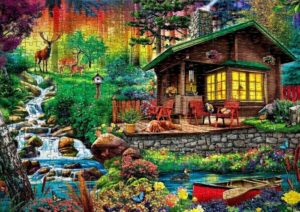
Fantasy roleplaying modules set the stage for this enthralling narrative, offering readers a glimpse into a story that is rich in detail and brimming with originality from the outset. These modules are essential tools that enhance gameplay, allowing players to dive into imaginative worlds filled with adventure, mystery, and creativity. From various types of modules available in the market, to popular examples that showcase unique features, the world of fantasy roleplaying is vast and inviting.
As we explore the integration of different game types, it’s fascinating to see how these modules not only elevate traditional board games through engaging storytelling but also enhance card games by adding intricate mechanics. Furthermore, we delve into the influence of fantasy roleplaying on digital gaming, where online games leverage these modules to craft immersive experiences, captivating players and driving their engagement.
Whether through a prototype design or insights into existing popular games, the possibilities are endless.
Fantasy Roleplaying Modules Overview
Fantasy roleplaying modules serve as structured adventures that guide players through a narrative experience in fantastical settings. They provide a framework for storytelling, character development, and gameplay mechanics, making them crucial for both new and experienced players. These modules not only facilitate the gameplay but also enhance immersion by providing rich lore, challenges, and opportunities for teamwork.Various types of fantasy roleplaying modules exist in the market, catering to different preferences and styles of play.
These modules can vary in complexity, length, and theme, each offering a unique experience for players. Understanding the types available can help players and game masters select the right module for their gaming sessions.
Types of Fantasy Roleplaying Modules
The fantasy roleplaying module landscape includes several distinct categories, each serving specific gameplay needs. Here are the primary types available:
- Adventure Modules: These are pre-written narratives that Artikel specific quests or adventures. They typically include maps, character descriptions, and encounter details. Adventure modules often cater to different levels of experience, allowing for a wide range of challenges.
- Campaign Settings: These modules provide extensive background information on a specific world or locale. They include guidelines for creating adventures within that setting, offering rich lore and cultural details that enhance the gameplay experience.
- One-Shots: Designed for quick play sessions, one-shots offer complete adventures that can be completed in one sitting. They are perfect for players who want a brief but engaging experience without the commitment of a longer campaign.
- Supplemental Modules: These expand existing games with new rules, classes, or items. They allow players to customize their gaming experience further, providing additional options for character development and gameplay mechanics.
Popular Fantasy Roleplaying Modules
Several fantasy roleplaying modules have gained popularity within the gaming community, noted for their engaging narratives and unique features. Below are a few examples that stand out:
- Dungeons & Dragons: Curse of Strahd
-This gothic horror adventure is set in the dark realm of Barovia, featuring the iconic vampire Strahd. It combines horror elements with classic fantasy, offering a rich, immersive experience. - Pathfinder: Rise of the Runelords
-This campaign is known for its intricate plot and character-driven storytelling. Players explore ancient ruins and face powerful foes, all while unraveling the mysteries of the Runelords. - Call of Cthulhu: Horror on the Orient Express
-Blending horror with detective work, this module takes players on a harrowing journey aboard the famous train, where dark secrets and unspeakable horrors await. - Fiasco: While not a traditional fantasy RPG, Fiasco offers a unique narrative experience that allows players to create a story filled with ambition, betrayal, and chaos. Its flexible nature makes it popular for one-shot sessions.
“Modules provide a structured approach to roleplaying, allowing players to dive into rich narratives and complex worlds without the initial need for extensive world-building.”
Integration of Other Game Types

Fantasy roleplaying modules possess a unique ability to blend and enhance various game types, creating a richer and more immersive gaming experience. By incorporating storytelling elements and mechanics from other genres, these modules can take board games, card games, and even arcade titles to new heights. The integration of these elements not only diversifies gameplay but also deepens player engagement through narrative-driven content and interactive mechanics.
Enhancement of Board Games Through Storytelling
Board games can significantly benefit from the storytelling elements found in fantasy roleplaying modules. By weaving intricate narratives, game designers can turn a standard board game into an epic adventure that engages players on multiple levels. The infusion of storytelling into gameplay creates a more immersive experience, allowing players to connect with characters, settings, and overarching plots.
One effective way to integrate storytelling into board games includes:
- Character Development: Allowing players to create and develop unique characters with distinct backgrounds and motivations enhances emotional investment in the game.
- Dynamic Events: Introducing random narrative events or quests that alter gameplay can keep players engaged and provide a sense of unpredictability.
- World-Building: Crafting a detailed game world with rich lore helps players feel as though they are part of a larger narrative, making actions within the game more significant.
The combination of strategy and narrative encourages players to think critically about their choices, ultimately enhancing the board game experience.
Relationship Between Card Games and Fantasy Roleplaying Modules
Card games and fantasy roleplaying modules share a symbiotic relationship, particularly in the mechanics that govern gameplay. Fantasy roleplaying modules often introduce new mechanics that can be seamlessly integrated into card games. These mechanics can shift traditional gameplay into more complex and interactive experiences.
Some of the mechanics that benefit card games include:
- Resource Management: Players often need to manage resources like mana, health, or equipment cards, mirroring the resource allocation seen in fantasy roleplaying games.
- Deck Building: Incorporating elements of deck-building allows players to customize their strategies, creating a sense of ownership over their gameplay experience.
- Special Abilities: Implementing unique character abilities or spells can add depth to card play, influencing tactical decisions and player interactions.
This blend of mechanics not only invigorates card gameplay but also attracts fans of both genres to engage with one another.
Influence of Arcade and Coin-Op Games on Module Design
Arcade and coin-op games have had a notable influence on the design of fantasy roleplaying modules. These games, often characterized by fast-paced action and immediate feedback, can inspire the pacing and structure of roleplaying scenarios. Elements from these genres can be utilized to create engaging and dynamic gameplay experiences in fantasy modules.
Key aspects that reflect this influence include:
- Fast-Paced Combat: Incorporating quick and responsive battle mechanics seen in arcade games can keep players engaged and encourage strategic thinking.
- Level Progression: Similar to arcade games where players earn points and unlock new levels, fantasy modules can implement a system where characters gain experience, unlock new abilities, and face more challenging foes.
- Visual and Audio Feedback: Utilizing captivating visuals and sound effects can heighten the immersive experience, akin to the sensory stimulation offered by arcade environments.
The fusion of these elements from arcade gaming into fantasy modules enriches the overall experience, appealing to a wide range of players while maintaining a narrative focus.
Influence on Digital Gaming
The integration of fantasy roleplaying modules into digital gaming has revolutionized the way players experience immersive worlds. By leveraging rich storytelling, character development, and expansive lore, online games have created environments where players can truly lose themselves. The fusion of traditional tabletop mechanics with advanced technology has allowed for a unique engagement that continues to evolve.The role of fantasy elements in video games is paramount.
These elements provide a canvas for creativity and imagination, allowing players to craft their unique experiences within the game world. From intricate quests to expansive worlds filled with mythical creatures, the inclusion of fantasy not only enriches the narrative but also enhances player engagement and satisfaction. Players are often drawn to games that allow deep customization and exploration of their characters, fostering a sense of ownership and connection to the game’s universe.
Utilization of Fantasy Roleplaying Modules in Online Games
Online games utilize fantasy roleplaying modules to create engaging and immersive experiences. This integration occurs in various ways, contributing to the depth and enjoyment of gameplay. Key aspects include:
- World-Building: Games like “World of Warcraft” and “The Elder Scrolls Online” feature vast landscapes, rich in lore and history. This allows players to explore and interact within a living world that feels alive and dynamic.
- Character Development: Players are given the tools to create and evolve their characters, choosing classes, skills, and traits that reflect their playstyle, similar to traditional roleplaying games.
- Quest Design: Engaging storylines and quests, often inspired by classic fantasy narratives, motivate players to progress through the game, tackling challenges that require strategy and cooperation.
- Community Engagement: Social aspects, such as guilds and multiplayer interactions, mirror the collaborative nature of tabletop games, fostering a sense of community and shared experience.
Fantasy elements in video games not only enrich the narrative but also significantly enhance player engagement and satisfaction.
The prototype design for an online roleplaying game that incorporates elements from traditional fantasy modules can be illustrated through the following features:
Setting
A sprawling, enchanted realm that features diverse biomes, from enchanted forests to desolate wastelands, all filled with unique cultures and histories.
Character Classes
Players can choose from familiar fantasy archetypes like wizards, warriors, and rogues, each with distinct abilities and skill trees to allow for personalized gameplay.
Questing System
A dynamic quest system that adapts to player choices, enabling multiple outcomes based on player interaction, encouraging exploration and replayability.
Crafting and Resource Gathering
Integrating a crafting system that allows players to gather materials and create unique items, enhancing the gameplay experience and providing a sense of achievement.
Multiplayer Collaboration
Mechanisms for players to form parties and tackle challenges together, echoing the cooperative nature of traditional tabletop experiences.Through these features, the game would serve as a homage to traditional fantasy roleplaying modules while leveraging the strengths of digital gaming to create an unforgettable experience.
Final Summary

In conclusion, fantasy roleplaying modules are a vital aspect of both traditional and digital gaming landscapes. They provide a framework for creative storytelling and player engagement, enriching the overall gaming experience. As we have seen, their integration with various game types and their influence on digital platforms demonstrate their versatility and significance in the gaming world. Embrace your imagination and dive into the captivating universe that fantasy roleplaying modules offer.
Answers to Common Questions
What are fantasy roleplaying modules?
Fantasy roleplaying modules are structured guides that provide settings, characters, and storylines for players in roleplaying games, enhancing gameplay through narrative-driven experiences.
How do I choose the right module for my game?
Choosing the right module involves considering your group’s interests, experience level, and the type of gameplay you prefer, whether it be combat-focused, story-driven, or a mix of both.
Can fantasy roleplaying modules be adapted for other game types?
Yes, many fantasy roleplaying modules can be adapted for board games, card games, and even digital formats, allowing for a flexible gaming experience.
Are there beginner-friendly fantasy roleplaying modules?
Yes, many modules are designed specifically for beginners, featuring simplified rules and guided narratives to help new players ease into the roleplaying experience.
How do online games utilize fantasy roleplaying modules?
Online games use fantasy roleplaying modules to create immersive experiences, incorporating detailed worlds, character development, and interactive storytelling that engage players deeply.






